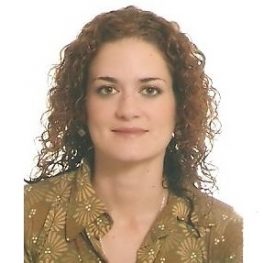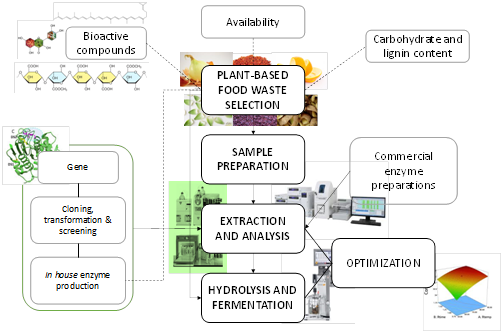
María del Prado García
GET-COFUND MarieS.Curie Fellow at UAH
Biotechnology approaches for food waste valorisation
About the research project “Biotechnology approaches for food waste valorisation”
Research Line: Increasing the sustainability of food chain by obtaining bioactive substances from agrofood industry residues
Mentor: Prof. María Luisa Marina Alegre
Abstract
The increased pressure on the environment has driven the search for sustainable and greener technologies based on renewable raw materials to meet overall targets of food, energy and chemicals. Concurrently, there is an increasing demand of replacing synthetic preservatives, flavours, aromas and colorants by compounds of natural origin. The food processing industries generate a vast amount of wastes rich in bioactive compounds that are presently underutilised. The use of enzyme technology for food waste valorisation represents a sustainable alternative approach of great potential to generate these products. The present project will primarily focus on the development of enzyme-based extraction methodologies adapted to selected food wastes and target compound. Enzyme technology will also be applied for further conversion of the residues after extraction to liquid biofuels and bioproducts. This type of studies is essential to develop biotechnologies for zero waste resulting in additional revenue for the food sector while reducing its environmental footprint.

Graphical abstract
About María García Aparicio
María García Aparicio graduated with a BSc degree in Biology (Molecular and Cellular Biology) from the University of Alcalá de Henares (UAH), Madrid. She was selected to carry out the end-of-year project under the supervision of Prof Manuel Hernández Cutuli in the former Department of Microbiology and Parasitology of the UAH. In 2007 she completed her PhD (cum laude) in the Biomass Unit of Ciemat (Madrid) under the supervision of Dr María José Negro Álvarez in the group of Dr Mercedes Ballesteros Perdices. María joined the Department of Process Engineering and Microbiology of Stellenbosch University (SU), South Africa, in 2008 as a postdoctoral research fellow (NRF and Claude Leon Foundation postdoc fellowships) and continued working with several contracts in the groups of Prof Johann Görgens and Prof Emile van Zyl.
María García-Aparicio has participated for more than 15 years in different research projects in the field of biorefinery: biomass conversion and utilisation for production of bioenergy and bio-products. The projects have been mainly focused on the use of local biomass sources and industrial wastes for production of fermentable sugars, oligomers, bioethanol, phenols and/or paper in an enzyme-based process. The enzymes used in these processes were commercial and/or produced specifically in house. She has also been involved in the evaluation of different production systems of industrially relevant enzymes to diversify the product portfolio of biorefineries. In addition, she participated in the development of robust xylose-fermenting industrial yeasts and the evaluation of paper sludges from local paper mills as feedstock for consolidated bioprocessing (CBP). All these research projects were done in collaboration with industrial and academic partners at local and international level.
The work from her research career resulted in the participation on local and international conferences, a Book Chapter, 7 book proceedings, 2 patents applications, 1 innovation disclosure and +25 manuscripts for publication. Additionally, she has written several watch reports with emphasis on biotechnology and the application of enzymes within biorefineries. She has trained and supervised interns, technicians, end-of-degree and postgraduate students (MSc and PhD) with practical work, report and thesis writing.
The objective of Dr María García-Aparicio is to apply the acquired experience and knowledge for the development of alternative and greener processes based on biotechnology. She will evaluate such processes for food waste valorisation as a GET-COFUND MarieCurie Fellow at the University of Alcalá (Micro-separation Techniques group).
Events
| ID | Event Name | Duration | Start Date |
|---|---|---|---|
| Semana de la Ciencia y la Innovación 2020 | Residuos de la industria alimentaria, de un problema ambiental a múltiples beneficios | 2 Days | 9 noviembre, 2025 |
| Meet our MSCA fellows! | Meet our GET Marie S. Curie COFUND fellows! | 1 Hours | 1 junio, 2025 |





